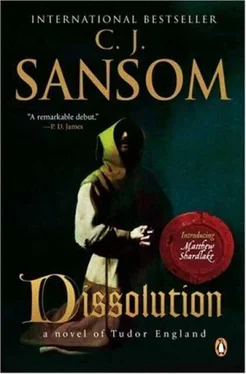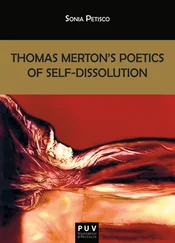C. Sansom - Dissolution
Здесь есть возможность читать онлайн «C. Sansom - Dissolution» весь текст электронной книги совершенно бесплатно (целиком полную версию без сокращений). В некоторых случаях можно слушать аудио, скачать через торрент в формате fb2 и присутствует краткое содержание. Жанр: Исторический детектив, на английском языке. Описание произведения, (предисловие) а так же отзывы посетителей доступны на портале библиотеки ЛибКат.
- Название:Dissolution
- Автор:
- Жанр:
- Год:неизвестен
- ISBN:нет данных
- Рейтинг книги:5 / 5. Голосов: 1
-
Избранное:Добавить в избранное
- Отзывы:
-
Ваша оценка:
- 100
- 1
- 2
- 3
- 4
- 5
Dissolution: краткое содержание, описание и аннотация
Предлагаем к чтению аннотацию, описание, краткое содержание или предисловие (зависит от того, что написал сам автор книги «Dissolution»). Если вы не нашли необходимую информацию о книге — напишите в комментариях, мы постараемся отыскать её.
Dissolution — читать онлайн бесплатно полную книгу (весь текст) целиком
Ниже представлен текст книги, разбитый по страницам. Система сохранения места последней прочитанной страницы, позволяет с удобством читать онлайн бесплатно книгу «Dissolution», без необходимости каждый раз заново искать на чём Вы остановились. Поставьте закладку, и сможете в любой момент перейти на страницу, на которой закончили чтение.
Интервал:
Закладка:
When King Henry learned of the events at St Donatus he had ordered that it be razed to the ground. Portinari, Cromwell's Italian engineer, who even now was demolishing Lewes Priory, was coming on to Scarnsea afterwards to take down the buildings. I had heard he was very skilled; at Lewes he had managed to undermine the foundations so the whole church came tumbling down at one go in great clouds of dust; they said in Scarnsea it had been a wonderful and terrible sight, and looked forward to seeing the spectacle repeated.
It had been a hard winter, and Portinari had been unable to get his men and equipment down to the Channel coast before spring came. They would be at Scarnsea in a week, but first the Augmentations officers had arrived to take away everything of value, down to the lead from the roof and the brass from the bells. It was an Augmentations man who met me at the gatehouse and checked my commission; Bugge and the other servants were long gone.
I had been surprised when Cromwell sent a letter ordering me to Scarnsea to supervise the process. I had heard little from him since making a brief visit to Westminster to discuss my report in December. He told me then that he had endured an uncomfortable half-hour with the king when Henry learned that mayhem and murder at a religious house had been kept from him for weeks, and that his new commissioner's assistant had absconded with the old commissioner's killer. Perhaps the king had boxed his chief minister's ears, as I had heard he was wont to do; at all events Cromwell's manner had been brusque and he dismissed me without thanks. His favour, I had taken it, was withdrawn.
Although I still held the formal title of commissioner I was not needed, the Augmentations officers were more than capable of carrying out the work, and I wondered whether Cromwell had thought to make me revisit the scene of those terrible experiences as a punishment for that uncomfortable half-hour of his. It would have been characteristic.
Justice Copynger, now the king's tenant of the former monastery lands, stood a little way off with another man, looking over plans. I approached him, passing a couple of Augmentations officers carrying armfuls of books from the library and heaping them up in the courtyard, ready for burning.
Copynger grasped my hand. 'Commissioner, how are you? We have better weather now than when you were last here.'
'Indeed. Spring is almost come, though that is a cold wind from the sea. How do you find the abbot's house?'
'I have settled in most happily. Abbot Fabian kept it in good repair. When the monastery is down I will have a fine view over the Channel.' He waved towards the monks' cemetery, where men were busy digging up the headstones. 'See, over there I am making a paddock for my horses; I bought the monks' whole stable at a good price.'
'I hope you have not put Augmentations men to that work, Sir Gilbert,' I said with a smile. Copynger had been ennobled at Christmas, touched on the shoulder by a sword held by the king himself; Cromwell needed loyal men in the shires more than ever now.
'No, no, those are my men, paid by me.' He gave me a haughty look. 'I was sorry you did not wish to stay with me while you are here.'
'This place has unhappy memories. I am better in the town, I hope you will understand.'
'Very well, sir, very well.' He nodded condescendingly. 'But you will dine with me later, I hope. I would like to show you the plans my surveyor here has drawn up; we are going to turn some of the monastery outhouses into sheep pens once the main buildings are down. That will be a spectacle, eh? Only a few days now.'
'It will indeed. If you will excuse me for now.' I bowed and left him, wrapping my coat around me against the wind.
I went through the door to the claustral buildings. Inside, the cloister walk was dirty and muddy from the passage of many booted feet. The auditor from Augmentations had set himself up in state in the refectory, where his men brought him a constant stream of plate and gilded statues, gold crosses and tapestries, copes and albs and even the monks' bedding – everything that might have value in the auction to be held in two days' time.
Master William Glench sat in a refectory stripped of its furnishings but filled with boxes and chests, his back to a roaring fire, discussing an entry in his great ledger with a scrivener. He was a tall, thin man with spectacles and a fussy manner; a whole raft of such people had been taken on at Augmentations over the winter. I introduced myself and Glench rose and bowed, after carefully marking the place in his book.
'You seem to have everything well organized,' I said.
He nodded portentously. 'Everything, sir, down to the very pots and pans in the kitchens.' His manner reminded me momentarily of Edwig; I suppressed a shudder.
'I see they are preparing to burn the books. Is that necessary? Might they not have some value?'
He shook his head firmly. 'No, sir. All the books are to be destroyed; they are instruments of papist worship. There's not one in honest English.'
I turned and opened a chest at random. It was full of ornamentation from the church. I lifted out a finely carved gold chalice. It was one of those Edwig had thrown into the fish pond after Orphan's body, to make people think her a runaway thief. I turned it over in my hands.
'Those are not to be sold,' Glench said. 'All the gold and silver is to go to the Tower mint for melting down. Sir Gilbert tried to buy some pieces. He says the ornamentation is fine and so it may be, but they're all baubles of papist ceremony. He should know better.'
'Yes,' I said, 'he should.' I put the chalice back.
Two men carried in a big wicker basket and the scrivener began unloading habits onto the table. 'These should have been cleaned,' the scrivener said crossly. 'They'd fetch more.'
I could sense Glench's impatience to be back at work. 'I will leave you,' I said. 'Make sure not to forget anything,' I added, taking a moment's pleasure in his affronted stare.
I crossed the cloister to the church, keeping a careful eye on the men scrambling over the roof; already fallen tiles lay dotted round the cloister square. Inside the church, light still streamed through the ornate stained-glass windows, still created a kaleidoscope of warm colours on the floor of the nave. But the walls and side chapels were bare now. The sound of hammering and voices echoed down from the roof. At the head of the nave the floor was broken, a mass of shattered tiles. It was the spot where Edwig had fallen and also where the bells would have landed when they had been cut from the roof. I looked up into the yawning empty space of the bell tower, remembering.
Going round the rood screen, I saw the lecterns and even the great organ had been removed. I shook my head and turned to leave.
Then I saw a cowled figure sitting in a corner of the choir stall, facing away from me. For a moment I felt a thrill of superstitious dread as I imagined Gabriel returned to mourn the ruin of his life's work. The figure turned and I almost cried out, for at first I could see no face under the hood, but then I made out the gaunt brown features of Brother Guy. He rose and bowed.
'Brother infirmarian,' I said, 'for a moment I thought you were a ghost.'
He smiled sadly. 'In a way I am.'
I approached and sat down, motioning him to join me. 'I am glad to see you,' he said. 'I wanted to thank you for my pension, Master Shardlake. I imagine it was you who saw I was given an increased allowance.'
'You were elected abbot, after all, when Abbot Fabian was declared incapable. You are entitled to a larger allowance, even if you only held the post a few weeks.'
'Prior Mortimus was not pleased when the brethren elected me over him. He has gone back to schoolmastering, you know, in Devon.'
Читать дальшеИнтервал:
Закладка:
Похожие книги на «Dissolution»
Представляем Вашему вниманию похожие книги на «Dissolution» списком для выбора. Мы отобрали схожую по названию и смыслу литературу в надежде предоставить читателям больше вариантов отыскать новые, интересные, ещё непрочитанные произведения.
Обсуждение, отзывы о книге «Dissolution» и просто собственные мнения читателей. Оставьте ваши комментарии, напишите, что Вы думаете о произведении, его смысле или главных героях. Укажите что конкретно понравилось, а что нет, и почему Вы так считаете.











